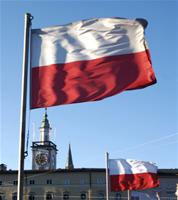Poland will again miss the euro
Adelina Marini, July 30, 2009
 The planned target - 2012 for Poland to introduce the single European currency will again be missed, the Polish deputy finance minister Ludwik Kotecki said yesterday, quoted by the FT. He said this during a debate on the amendment of the budget for 2009 in the upper chamber of parliament, by adding that the macroeconomic situation had completely changed since last September when the country’s prime minister, Donald Tusk, announced the goal one of the biggest EU member states to join the euro in 2012.
The planned target - 2012 for Poland to introduce the single European currency will again be missed, the Polish deputy finance minister Ludwik Kotecki said yesterday, quoted by the FT. He said this during a debate on the amendment of the budget for 2009 in the upper chamber of parliament, by adding that the macroeconomic situation had completely changed since last September when the country’s prime minister, Donald Tusk, announced the goal one of the biggest EU member states to join the euro in 2012.
Next month (August) the government is expected to announce a strategic framework of the national plan of the euro introduction. It will include additional conditions, Mr. Kotecki added without being more specific. "Today we can say that joining the Eurozone in 2012 is unfeasible,” Mr Kotecki said. This is the first official admission that Poland will not be able to meet its Eurozone target. The efforts of Warsaw to join the euro helped ease investor fears about Poland following the collapse of Lehman Brothers which shook confidence in emerging markets, especially those in central Europe.
But the picture is much more complex and, in spite the fact that the Polish Central Bank still forecasts 0.8% growth for this year, the data of the Ministry of finance for last month show that the  budget deficit in the first five months of this year alone had reached 90 per cent of the government’s full-year target of 18.2 bn zlotys or €4.3 bn.
budget deficit in the first five months of this year alone had reached 90 per cent of the government’s full-year target of 18.2 bn zlotys or €4.3 bn.
During the debate Mr. Kotecki explained that with such a deficit Poland will not be able to fulfill the fiscal criteria of the Eurozone. Earlier this month the EU formally opened an excessive deficit procedure against Poland calling on the country together with several other member states, mainly new ones. According to the Stability and growth pact the deficit should be below the 3 per cent of GDP but this year it is expected to be 6.6%, according to the Commission. In comparison to last year's deficit of 3.9%.
Euro area membership is one of the main priorities of the new Bulgarian government. However it is becoming more and more cautious in its estimations of the financial situation of Bulgaria because of the constant surprises left by the previous coalition government, led by the socialists. For example, yesterday the new financial minister announced that the budget will need 2.5 bn lv (1.75 bn euro) so as to avoid deficit in the end of the year. Only a day earlier Mr. Simeon Dyankov projected 1.5-2 bn lv shortage. Yesterday he explained that the situation with the budget is much worse than he expected and far from what the previous minister Plamen Oresharski assured.
 Angela Merkel, Emmanuel Macron | © Council of the EU
Angela Merkel, Emmanuel Macron | © Council of the EU Benoit Coeure | © Council of the EU
Benoit Coeure | © Council of the EU Pierre Moscovici | © Council of the EU
Pierre Moscovici | © Council of the EU